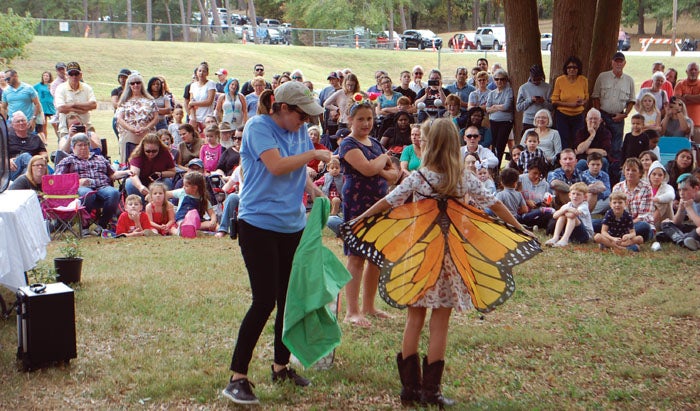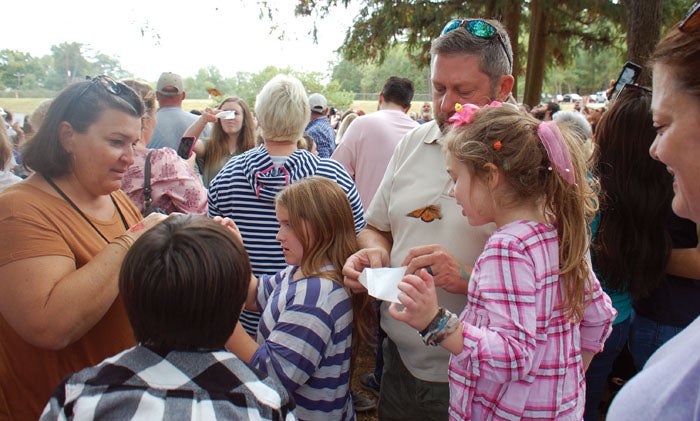Large crowd shows up for release of monarchs at Hurley Park
Published 12:01 am Monday, October 7, 2019
By Mark Wineka
mark.wineka@salisburypost.com
SALISBURY — Since her death in April, Barbara Gentry Hardister has been giving her family signs — through butterflies.
So it was appropriate Sunday that Barbara’s daughters Sharon Beck, Kim Riddle and Mandy Bostian joined Barbara’s sisters Rebecca Douglass, Pat Cranford and Debbie McClintock — along with spouses and grandchildren — in releasing 10 monarch butterflies in her memory.
Their butterflies were among the 160 monarchs released at Elizabeth Holmes Hurley Park. Of those, the park staff presold 110 monarchs for the release, and several of those were purchased to pay tribute to lost loved ones.
Several hundred people attended the release, held in the annex section of Hurley Park just below City Lake.
All-a-Flutter Farms of High Point supplied the monarchs, which carried tiny tags on their wings for tracking purposes. At their release, the monarchs officially started their innate migration to Mexico.
Pat Cranford, one of Barbara Hardister’s sisters, said “it seems like every day” that family members have noticed butterflies, as if Barbara were communicating.
It started happening as soon as they returned from her funeral. They found Barbara had marked certain passages of Scripture and Psalms with butterfly stickers.
On her refrigerator door, Barbara, who was dying of cancer, posted the story of a caterpillar who just as it feared its life was ending became a butterfly.
And that’s how Barbara looked at the transition ahead of her.
“This was perfect timing,” daughter Sharon Beck said. “They’ve been showing up every day, giving us signs there is a better life.”
Nora Aker, co-owner of All-a-Flutter Farms, gave her usual educational program on monarchs. She and husband Brandon’s farm is devoted full time to raising butterflies and the plants they need.
They specialize in monarchs and offer tours, family shows and birthday parties, along with educational sessions for parks, schools, day care centers, camps and other organizations.
The farm also sells its monarchs to businesses and individuals for occasions such as weddings, funerals, birthdays, grand openings and graduations, with releases often used to signify celebrations or new beginnings.
The couple raise 10,000 to 15,000 monarchs a season, which in North Carolina lasts from April to October when the temperatures generally are 60 degrees and above.
“We start from scratch every single spring,” Aker said.
The couple depend on a Florida farm to supply the eggs.
Aker said monarchs have joined honeybees as coming close to being considered an endangered species in North Carolina because of the growing scarcity of milkweed, where monarchs lay their eggs.
Monarchs are the size of a human eyelash when they are born, but in two weeks they grow about 10,000 times their original size. They eat, grow and shed skin before attaching themselves upside down and forming a chrysalis.
Over time, the chrysalis turns colors from bright lime green to black to clear before the monarch emerges.
The whole process — from eggs to chrysalis to butterfly — takes about 30 days. As a butterfly, the monarch has a lifespan of only about two weeks. It spends its time eating and laying 200 to 600 eggs.
Monarchs also are the only butterflies in North America to migrate. In fall, certain monarchs, such as the ones released Sunday, will not lay eggs but migrate instead to Mexico. These migrating monarchs can live as long as six months.
Male monarchs have two dots on their wings; females, no dots.
Monarchs use their knees for hearing and have a long tongue and compound eyes made of 12,000 tiny eyes.
Using numerous children in the audience to help with her presentation, Aker also went into the differences between butterflies and moths.
Sunday’s release of the monarchs happened with a countdown — 3-2-1-release — but all the butterflies did not take off for Mexico at once. Some lingered. Some flew to other people. Others found a tree branch.
But soon they were all on their own, providing signs of things to come.
Contact Mark Wineka at 704-797-4263.








